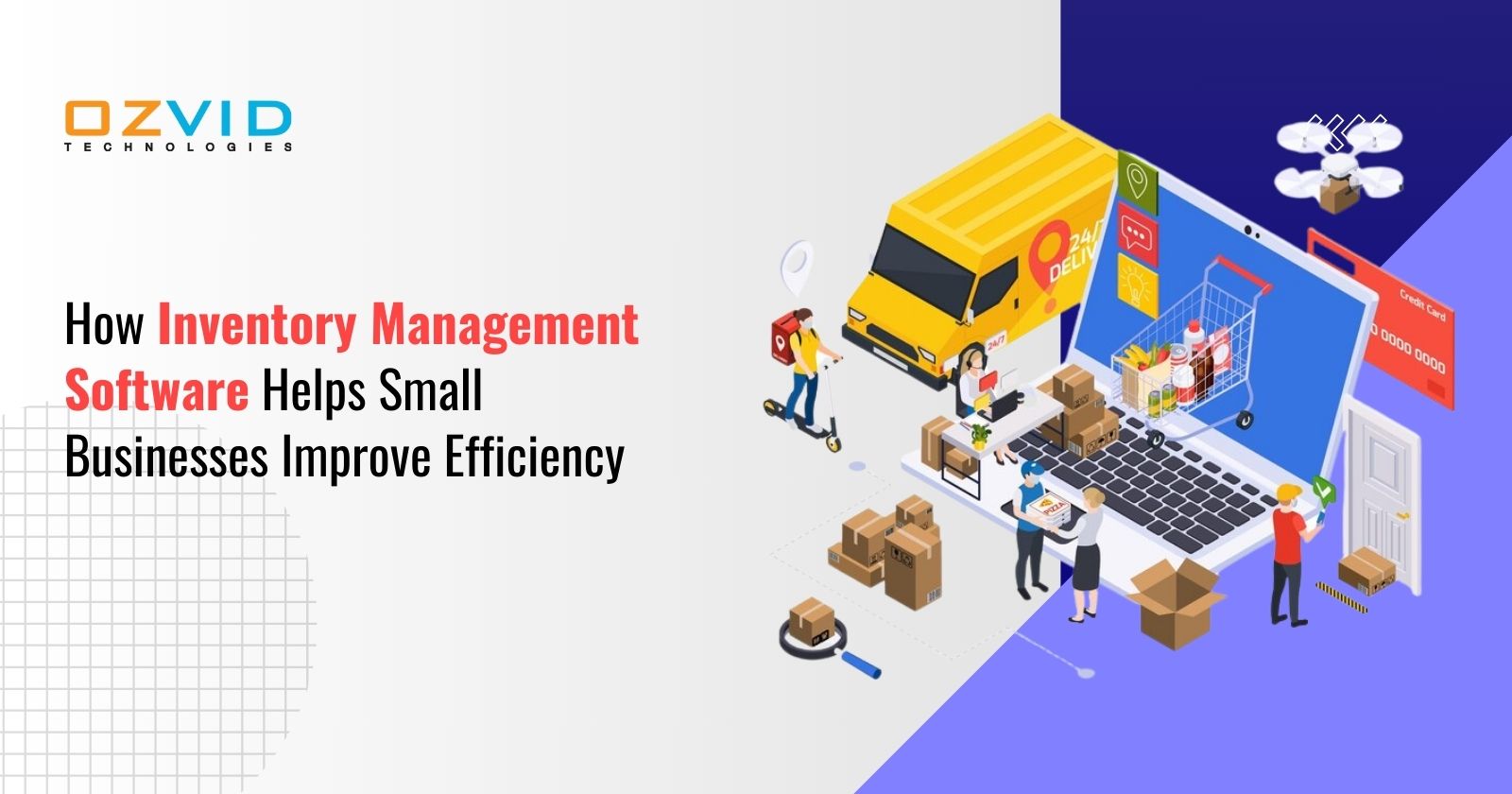- Mar 31, 2025
- Web Development
- 2614
Share this post on:

In the rapidly changing business environment of small business operations, efficient management of inventory can be the key to success or failure. It is a common problem faced by small businesses to manage stock manually, which results in stock outs, excess inventory, and inefficiency in finances. That's where inventory management software comes into the picture. As a tool to ease inventory tracking, minimize errors, and maximize operating efficiency, inventory management software is a small business game-changer.
What is Inventory Management Software?
Inventory management software is a program that automates the process of monitoring and managing inventory levels, orders, sales, and deliveries. It gives companies real-time information on inventory status to enable them to make informed decisions regarding ordering, stocking, and selling products. For small businesses, the software can greatly simplify business operations and save time in performing manual procedures.
Key Takeaways
- Automation Saves Time and Reduces Errors: Inventory management software automates routine tasks like stock tracking, reducing the risk of human error and saving time.
- Optimizes Cash Flow: By accurately forecasting demand and maintaining optimal stock levels, small businesses can manage their cash flow more effectively.
- Improves Operational Efficiency: Real-time updates, automated processes, and integration with sales and order management systems streamline operations and boost productivity.
- Provides Valuable Data Insights: Business owners can access real-time data to make informed decisions and optimize inventory practices.
Scalability: Inventory management software grows with your business, ensuring it can handle increased demands as your company expands.
How Inventory Management Software Helps Small Businesses
1. Reduces Human Error and Time Spent on Manual Tasks
Manual inventory tracking often leads to miscounted stock, misplaced items, and inaccurate records, resulting in incorrect orders, lost sales, and financial losses. Human errors in data entry or stock calculations can significantly impact a business’s bottom line.
How Inventory Management Software Helps:
- Automated Stock Tracking – The software automatically updates stock levels after every sale, return, or new stock arrival.
- Barcode and QR Code Scanning – Instead of manually entering product details, employees can scan barcodes for accurate stock tracking.
- Cloud-Based Data Synchronization – Inventory data is updated in real-time, ensuring accurate stock records across all locations.
Example:
A small retail store using IMS can automatically update inventory counts whenever a customer makes a purchase. This eliminates the need for manual stock counting, reducing errors and saving hours of labor every week.
Key Benefits:
- Eliminates costly data entry errors
- Reduces stock discrepancies
- Saves time and improves accuracy
2. Prevents Stockouts and Overstocking
A major challenge in inventory management is finding the right balance between stock levels. Running out of stock can result in missed sales opportunities and unhappy customers, while overstocking ties up capital and increases storage costs.
How Inventory Management Software Helps:
- Real-Time Stock Monitoring – Businesses can check inventory levels in real time, preventing unexpected shortages.
- Automated Restocking Alerts – The system notifies business owners when stock is low, ensuring timely reorders.
- Demand Forecasting – AI-driven inventory management tools analyze past sales trends to predict future demand, ensuring businesses stock the right products.
Example:
A clothing boutique that sells seasonal items uses IMS to analyze past sales data. This helps the owner predict demand and avoid overstocking summer wear in winter, reducing storage costs and preventing wastage.
Key Benefits:
- Avoids lost sales due to stockouts
- Reduces excess inventory and storage costs
- Ensures optimal stock levels at all times
3. Improves Order Accuracy and Faster Order Fulfillment
For businesses handling multiple orders daily, managing orders manually leads to processing errors, delayed shipments, and dissatisfied customers. Efficient order fulfillment is crucial for improving customer experience and increasing repeat business.
How Inventory Management Software Helps:
- Automated Order Processing – Orders are processed instantly, reducing delays and improving order accuracy.
- Integrated with Sales Channels – IMS syncs inventory across physical stores, e-commerce websites, and marketplaces like Amazon and Shopify.
- Faster Pick, Pack & Ship Process – IMS provides warehouse navigation assistance, helping employees locate products quickly.
Example:
A small e-commerce business using IMS can sync inventory across multiple sales channels. When a product sells on Shopify, it is automatically updated on Amazon and eBay, preventing overselling and ensuring accurate order fulfillment.
Key Benefits:
- Improves order accuracy
- Reduces fulfillment delays
- Enhances customer satisfaction
4. Provides Real-Time Inventory Visibility
Small businesses often struggle with inventory visibility, especially when managing multiple locations or online sales platforms. Without real-time tracking, businesses risk making poor decisions based on outdated stock information.
How Inventory Management Software Helps:
- Centralized Inventory Dashboard – Provides an overview of stock levels across multiple warehouses, stores, and online platforms.
- Live Tracking of Stock Movement – Businesses can track product movement from supplier to warehouse to customer.
- Mobile Accessibility – Cloud-based IMS allows business owners to check stock levels remotely from any device.
Example:
A restaurant chain can track ingredient levels across multiple outlets. If one outlet is running low on supplies, the system sends an alert, allowing the manager to quickly restock.
Key Benefits:
- Offers complete inventory transparency
- Helps businesses make informed decisions
- Prevents stock shortages and mismanagement
5. Reduces Operational Costs
Poor inventory management leads to higher storage costs, wasted resources, and inefficiencies that impact profitability. IMS helps small businesses cut costs by optimizing stock levels, reducing labor costs, and minimizing product wastage.
How Inventory Management Software Helps:
- Optimized Reordering System – The software ensures businesses order only the required quantity, reducing excess stock storage costs.
- Minimizes Labor Costs – Employees spend less time on manual stock checks and order processing, improving productivity.
- Avoids Expired & Dead Stock – IMS tracks product expiry dates and sends alerts, preventing wastage.
Example:
A pharmacy using IMS can monitor expiration dates of medicines and sell them before they expire, reducing financial losses.
Key Benefits:
- Reduces storage and holding costs
- Prevents unnecessary labor expenses
- Minimizes product wastage
6. Enhances Supplier Relationship Management
Small businesses rely on timely and cost-effective stock replenishment from suppliers. Managing multiple suppliers manually can lead to missed orders, delayed deliveries, and supply chain disruptions.
How Inventory Management Software Helps:
- Automated Supplier Ordering – IMS can automatically place purchase orders when stock reaches a minimum threshold.
- Tracks Supplier Performance – Businesses can monitor supplier delivery times, costs, and reliability.
- Improves Negotiation Power – Businesses can use data insights to negotiate better deals with suppliers.
Example:
A furniture store tracks supplier performance using IMS. If a supplier frequently delivers late, the business can switch to a more reliable supplier, ensuring smoother operations.
Key Benefits:
- Ensures timely restocking of inventory
- Strengthens supplier relationships
- Helps businesses secure better pricing
7. Supports Multi-Channel Selling
Many small businesses sell through physical stores, websites, and third-party marketplaces. Managing inventory across multiple sales channels manually can result in stock mismatches and overselling issues.
How Inventory Management Software Helps:
- Real-Time Stock Syncing Across Platforms – IMS ensures accurate stock updates on Shopify, Amazon, eBay, and brick-and-mortar stores.
- Prevents Overselling – When a product is sold on one platform, it’s automatically updated across all channels.
- Centralized Order Management – Businesses can process orders from one dashboard, streamlining operations.
Example:
An electronics store selling on Shopify and Facebook Marketplace no longer has to manually update stock. If a product sells out, it is automatically removed from all sales platforms.
Key Benefits:
- Prevents inventory mismanagement
- Improves efficiency across multiple sales channels
- Enhances customer trust by reducing cancellations
Conclusion
For small companies, dealing with inventory effectively is vital for success. Inventory management software offers a wide variety of benefits, from reducing mistakes and saving time to enhancing cash flow and streamlining operations. By leveraging technology, small companies can enhance efficiency, make better decisions, and position themselves for growth. If you're seeking out a reliable and scalable inventory management solution, OZVID Technologies is right here to assist. We provide tailor-made software solutions designed to fulfill the specific desires of small companies. Explore how our superior inventory management tools can assist your business to thrive in today's competitive market. Reach out to us these days for extra information.
Frequently Asked Questions
1. What is the cost of inventory management software for small businesses?
The cost of inventory management software varies depending on the features, the number of users, and the size of the business. Many solutions offer affordable plans for small businesses, with options to scale as your business grows.
2. How does inventory management software help prevent stockouts?
Inventory management software uses real-time tracking and demand forecasting to predict when stock levels are running low. This allows business owners to reorder products in time, preventing stockouts and lost sales.
3. Can inventory management software integrate with e-commerce platforms?
Yes, most inventory management software can integrate with e-commerce platforms like Shopify, Amazon, and eBay. This helps small businesses sync their inventory across multiple channels, reducing the risk of overselling.
4. Is inventory management software easy to use for small businesses?
Yes, most inventory management software is designed with user-friendliness in mind. Many platforms offer easy-to-navigate interfaces and provide tutorials to help business owners get started quickly.
5. What types of small businesses can benefit from inventory management software?
Small businesses across various industries, including retail, e-commerce, and manufacturing, can benefit from inventory management software. Whether you’re selling physical products or managing raw materials, the software can help optimize inventory processes.










